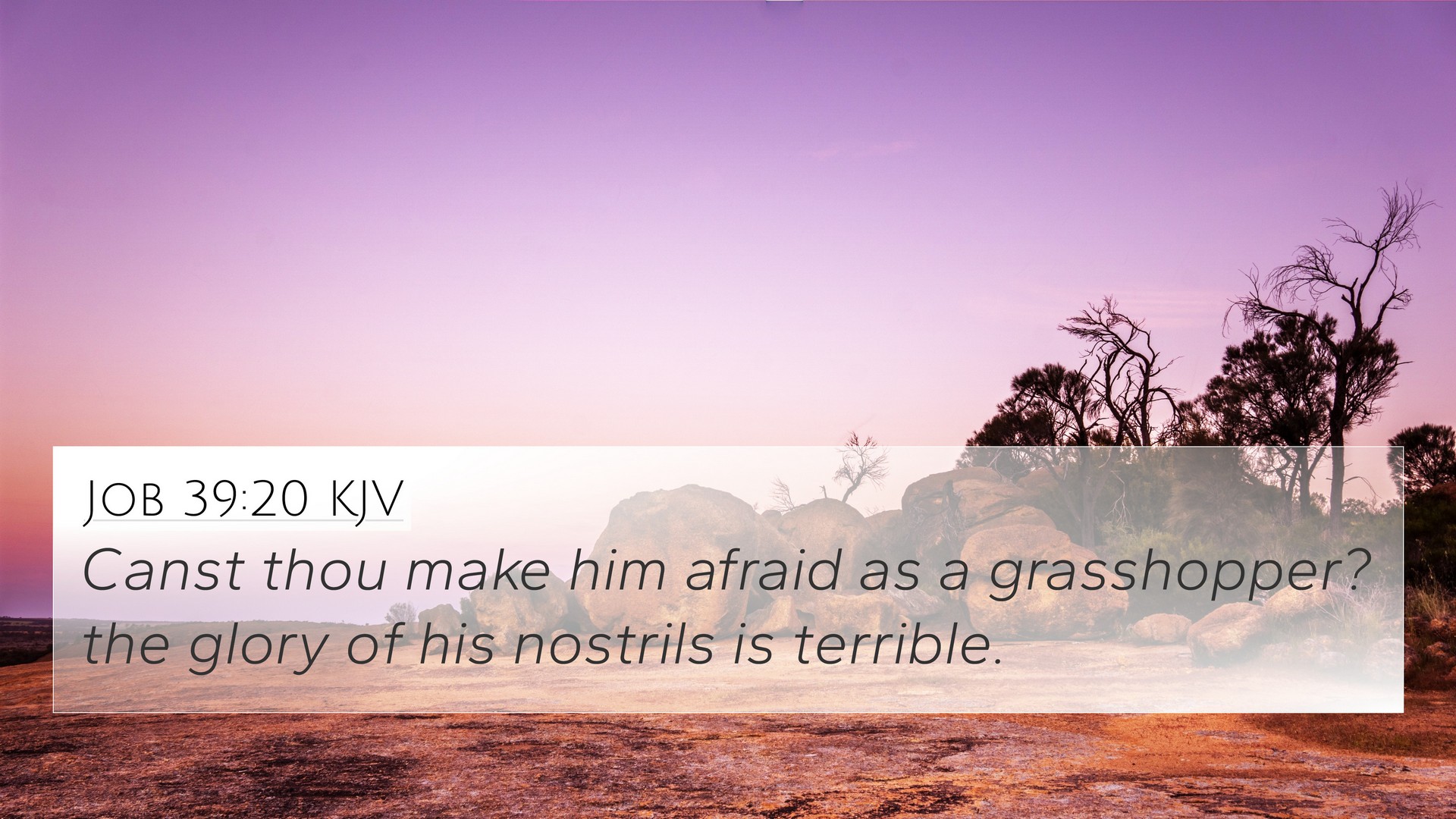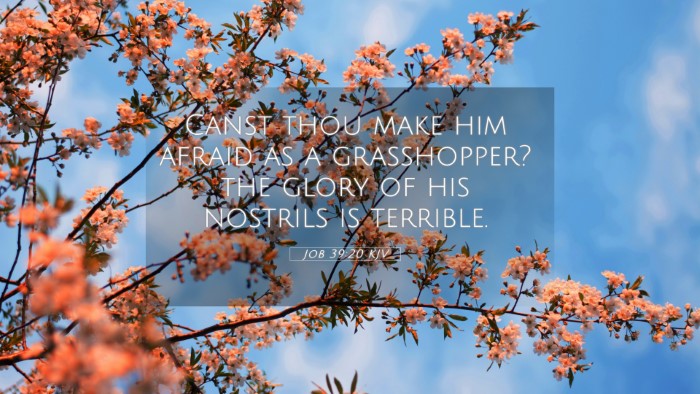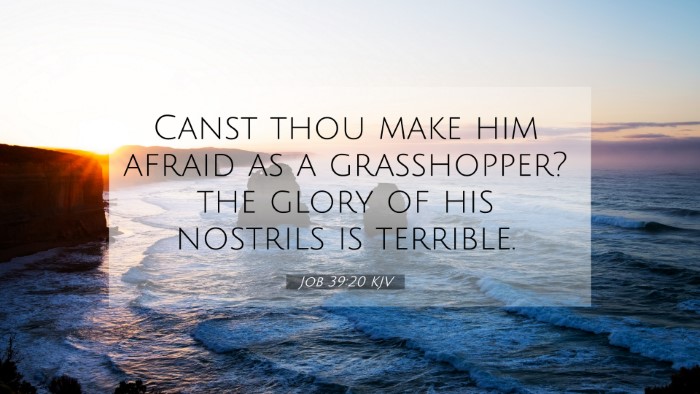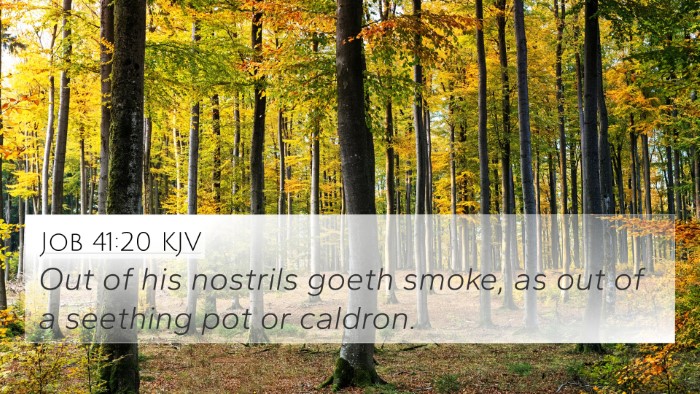Old Testament
Genesis Exodus Leviticus Numbers Deuteronomy Joshua Judges Ruth 1 Samuel 2 Samuel 1 Kings 2 Kings 1 Chronicles 2 Chronicles Ezra Nehemiah Esther Job Psalms Proverbs Ecclesiastes Song of Solomon Isaiah Jeremiah Lamentations Ezekiel Daniel Hosea Joel Amos Obadiah Jonah Micah Nahum Habakkuk Zephaniah Haggai Zechariah MalachiJob 39:20 Similar Verses
Job 39:20 Cross References
Canst thou make him afraid as a grasshopper? the glory of his nostrils is terrible.
Uncover the Rich Themes and Topics of This Bible Verse
Listed below are the Bible themes associated with Job 39:20. We invite you to explore each theme to gain deeper insights into the Scriptures.
Job 39:20 Cross Reference Verses
This section features a detailed cross-reference designed to enrich your understanding of the Scriptures. Below, you will find carefully selected verses that echo the themes and teachings related to Job 39:20 KJV. Click on any image to explore detailed analyses of related Bible verses and uncover deeper theological insights.
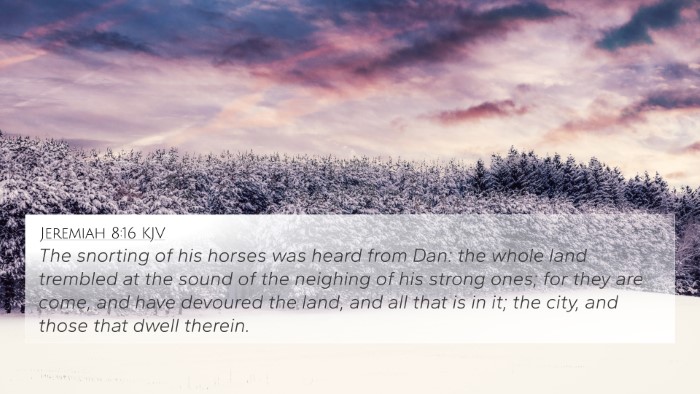
Jeremiah 8:16 (KJV) »
The snorting of his horses was heard from Dan: the whole land trembled at the sound of the neighing of his strong ones; for they are come, and have devoured the land, and all that is in it; the city, and those that dwell therein.
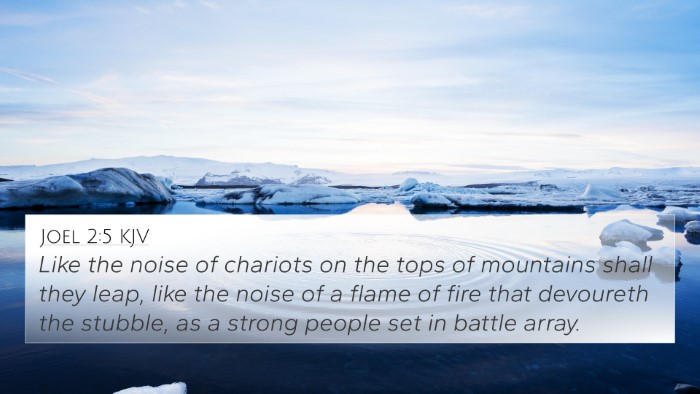
Joel 2:5 (KJV) »
Like the noise of chariots on the tops of mountains shall they leap, like the noise of a flame of fire that devoureth the stubble, as a strong people set in battle array.
Job 39:20 Verse Analysis and Similar Verses
Understanding Job 39:20
Verse Reference: Job 39:20
Text: "Amidst the din of battle, the horse gives a mighty neigh; and in its strength, it leaps into the fray, as though it cannot understand that it may die." (Paraphrased for understanding)
Overview of Job 39:20
The verse from Job illustrates the power and instinct of the horse in battle. It is often interpreted as showcasing the creature's fearless strength and eagerness for the tumult of war, highlighting themes of natural instinct, courage, and perhaps a lack of awareness of mortality. This encapsulates broader existential questions that are central to the Book of Job.
Commentary Insights
-
Matthew Henry's Commentary:
Henry reflects on the fierce and bold nature of the horse, portraying it as a creature that embraces danger and chaos without the understanding of the perils it faces. He emphasizes the contrast between the animal's instinctual bravery and human understanding of mortality. Thus, it exemplifies a certain purity of purpose, unfettered by fear.
-
Albert Barnes' Notes:
Barnes delves into the metaphorical implications of the text, noting that the horse's exuberance could parallel the human condition—especially regarding the initial ignorance of life's hardships. The horse, in its ignorance, plunges into battle, symbolizing humanity's tendency to engage with life boldly, often without foresight of the adversities that lie ahead.
-
Adam Clarke's Commentary:
Clarke’s insights highlight the horse as a creation of God, endowed with unique strengths. He suggests that the verse speaks to God's sovereignty in creation and the natural instincts imparted to creatures. This awareness elevates the understanding of divine intention in the natural world and underscores the beauty of innate instincts as a part of God's design.
Thematic Connections
Job 39:20 can be linked to various biblical themes, particularly concerning the relationship between God’s creation and humanity. Below are some thematic connections:
- Courage and Bravery: The horse, embodying courage, invites reflections on how we face our own battles.
- Instinct vs. Awareness: A juxtaposition of natural instinct with human understanding invites a deeper analysis of our responses to life's challenges.
- Divine Sovereignty: The entirety of God's creation, including animals like horses, serves His purpose, reminding us of our place in the created order.
Cross-References
Exploring Job 39:20 leads to various relevant cross-references that enrich our understanding:
- Psalm 104:25-26: Speaks about the majestic creatures of the sea, illustrating God's creativity and omnipresence.
- Isaiah 40:31: "But they that wait upon the Lord shall renew their strength; they shall mount up with wings as eagles." This verse ties the idea of strength and reliance on God.
- Proverbs 21:31: "The horse is prepared for the day of battle, but victory belongs to the Lord," emphasizing divine sovereignty despite a creature's instinctual role.
- 1 Peter 5:7: "Casting all your care upon Him; for He careth for you," connecting to the theme of courage under God's providence.
- Ecclesiastes 3:19: Reflects on the fate of man and beast alike, reminding us of the commonality of existence and mortality.
- Job 39:19: The preceding verse discusses the horse's strength in battle, setting the stage for understanding its behavior.
- Revelation 19:11: A depiction of Christ returning on a white horse, further linking the symbolism of horses in the biblical narrative.
Conclusion
Job 39:20 serves as a powerful reminder of the instinctual bravery of the creatures God created, while also reflecting on human experiences in facing life's battles. The insightful commentaries reveal layers of meaning, encouraging readers to dig deeper into both the text and its implications in their lives.
Tools for Further Study
For those seeking to understand more about how verses like Job 39:20 connect and resonate throughout the Scriptures, several resources can aid in this endeavor:
- Bible Concordance: A comprehensive tool for locating keywords and phrases across the Bible.
- Bible Cross-Reference Guide: Helps in identifying thematic connections and parallels between verses.
- Cross-Reference Bible Study: Methods for studying Scripture in relation to cross-referenced texts.
